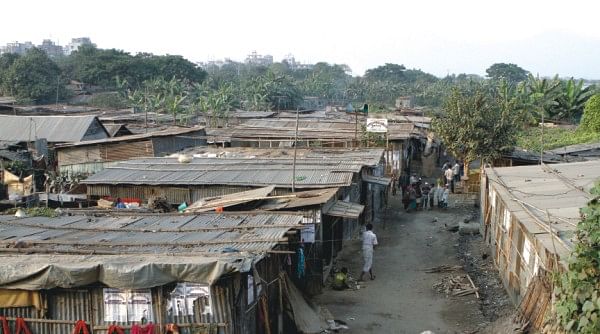|
Crime
Trapped in a Diabolical Web
On January 10, the Pallabi Police shot 19-year-old college student Abir in the right leg; he later bled to death. Police alleged that he was preparing for a robbery at a slum in Pallabi's Balurmath area, a haven for drug peddling and was killed when the gang Abir was with started shooting at the police. While mystery shrouds the case, it is clear that this was yet another case of extra judicial killing. The story is also of how a drug peddler is protected and a young man gets caught in the web of drugs, guns and police brutality.
Rifat Munim
For Monwara Begum, an officer of Titas Gas, it was yet another ordinary day. As the twilight descended on the Rupnagar residential area, the mother, who had been suffering from electrolyte imbalance for almost a year now, was happily spending the evening with her family, without knowing that it would turn out to be the worst day of her life. When her elder son Imtiaz Hossain Abir wanted to go out with some of his friends at around 7:00pm, she wasn't too concerned but still asked him to come back in an hour so that they could have dinner together. And Abir did come back next day, not as the bright boy that he used to be, but as a bloodstained corpse dissected in the morgue.
 |
Imtiaz Hossain Abir
His friends and neighbours unanimously agree that Abir was a decent college-going fellow with no apparent anti-social behaviour. |
Abir was a first year student of Business Studies at the Northern College in Mohammadpur. On the evening of January 10, he went out and was with his friends near a badminton court till 8:30pm. He received a call on his cell phone, after which he left. As he was getting late, his mother called and he answered saying that he would be home in less than 30 minutes or so. But he did not make it home that night. The next day it was from a news broad cast on a television channel that the parents came to know that their 19-year-old son had been killed in an encounter with the police. Although the police came up with several versions of what had happened that night, they emphasised Abir's involvement with a gang of robbers who were preparing to rob or kill or attack somebody. Abir, however, did not have a case or even a general diary filed against him. Abir's mother has since become ill with grief and his father Kazi Md Golam Faruque, deputy general manager of Titas Gas, cannot quite fathom why his son had to be killed.
“I don't know what to do or say,” says the distraught father, “The last time I saw and touched his face was when I laid him to rest. And I can't remove his face from my mind. The only bad thing we knew about him was his irregularity in class. But many students are irregular. They don't get killed for that.” Faruque has decided not to take any legal step fearing further dire consequences for his family, particularly for his school-going boy and elder daughter. “When Abir was getting too late, his mother called again at around 9:30pm. An unknown voice answered the call and asked about the whereabouts of our family. Then we suspected something must be wrong. But that he would be killed by the police was far beyond what we had thought,” he adds. The identity of the person is still unknown and there is little a chance that the mobile will be retrieved. But what now plagues the parents most are the cooked up stories about Abir's involvement with criminals and forcing the slum dwellers to testify to their made-up stories only to justify their killing.
Sources at Dhaka Medical College Morgue have said he was shot in the right leg at 'close range'. The first point to be considered in this regard is whether he should have been shot or not. And the second point involves a very simple question: can a gunshot wound in the leg be fatal? According to the sources, who preferred anonymity, the bullet made a big hole in his leg, and he died from bleeding. However, Iqbal Hossain, the officer-in-charge of the Pallabi Police Station, says, “We took him immediately to the hospital. Since he was drunk, his resistance power was reduced and eventually he died.”
Not only have the morgue sources rejected the idea of his drunkenness, the police also have not mentioned anything about Abir being drunk in the inquest report. This begs another question: why was he just allowed to die?
His friends and neighbours unanimously agree that Abir was a decent, college-going fellow with no apparent anti-social behaviour. Noman, one of his close friends, says that Abir had no political affiliation, let alone involvement with a gang of robbers or group of criminals. Sohag, one of his local acquaintances, says that Abir did not spend much time in the neighbourhood in the last three months. He also admits that Abir was a very good fellow and friend of theirs.
However, Awlaz Hossain, the next door neighbour of Abir's, says that he had at times seen Abir mix with boys who came from other localities. But he also says that Abir has never been involved with any kind trouble in the neighbourhood. As for his friends outside his neighbourhood, Noman, Sohag or others could not provide any information. “We understood that Abir was spending time with a circle outside our locality. We don't know who they are or where they live,” says Noman.
His neighbours and friends' views along with his family background explain that a boy who has never been accused of or involved in any kind of violence or trouble can hardly be as violent as the police now describe him to be.
 |
The Balurmath slum in Bauniabandh area where Abir was killed. Photo: zahedul i khan |
At the slum in the Bauniabandh Balurmath area the first clues of what might have happened on January 10 seem to surface. According to another version of the police, Abir and his friends were preparing to kill a man named Babul. Babul happens to be a well known drug peddler of the area, who sells ganja without getting into any trouble. Many of the local people have alleged that he is also on amicable terms with the police. As he was not available since the evening that day, informs one of the dwellers, a lot of ganja buyers thronged the place in search of Babul and many of them at one point went a little crazy not being able to get their ganja.
However, OC Iqbal Hossain says, “We were informed that some hooligans were vandalising shops and firing blank shots in the air at the Balurmath slum. When our team went there, one from the gang opened fire at first. Then we fired back in self-defence.” The morgue source, however, have said that the shot was taken from very 'close range'. If they shot back for self-defence, that had to be done from a certain distance; none of the police personnel were injured in the alleged shootout. So the claim that any group opened fire first is hard to buy. This is the most exasperating part of the police narratives about such encounters: you will always hear that the terrorists open fire first, whereas the ones that always get killed are not anyone belonging to the police, but the terrorists or may be just innocent people.
Most of the slum dwellers do not want to talk or pass any comment about this incident. Those who have agreed to talk on condition of anonymity say that nobody that day threatened or vandalised their place or shops, nor did anyone fired blank gunshots in the air, but many of the outsiders were calling Babul names because he was not present. Such a statement again invalidates another version of the police that there was vandalism prior to the shootout.
However, one thing becomes crystal clear that Abir was there in person on that day, not for robbery, nor for vandalism or extortion, but perhaps because he kept bad company. There is no way to know what exactly happened that day since his friends who were with him that day are absconding and his mobile, the only clue to identify his friends, seems to have disappeared. Yet, putting together all the details from Abir's family, friends, and the slum dwellers, and putting aside all the fabricated stories of the police, one can easily understand that Abir, a novice, could not even run away like the hooligans he was with and so slipped into the trap. It also reinforces the idea that he was just an amateur in this world of narcotic drugs and could be arrested if found guilty with something. Sadly enough, the idea as well as the practice of arresting someone is disappearing from the law enforcing agencies. They are rather adapting themselves to the practice of deliberately shooting a 19-year-old boy, not for self-defence, but just for being with some drug-addicted friends. Drug dealers like Babul, meanwhile, never get caught by the police.
Neither Monwara Begum nor Golam Faruque comprehends such complicated ramifications surrounding their son's death. All they know is that their son did not deserve to die just because he got mixed up with bad company. But it is too late to put things right. Yet one may at least hope that the government would immediately address the surreptitious link between the drug peddlers and the law enforcing agencies and inculcate the latter that their duty is to curb drug dealing altogether, not to encourage it; and bring the real culprits to book instead of resorting to point blank killing of individuals they 'think' are criminals.
Copyright
(R) thedailystar.net 2010 |
| |
